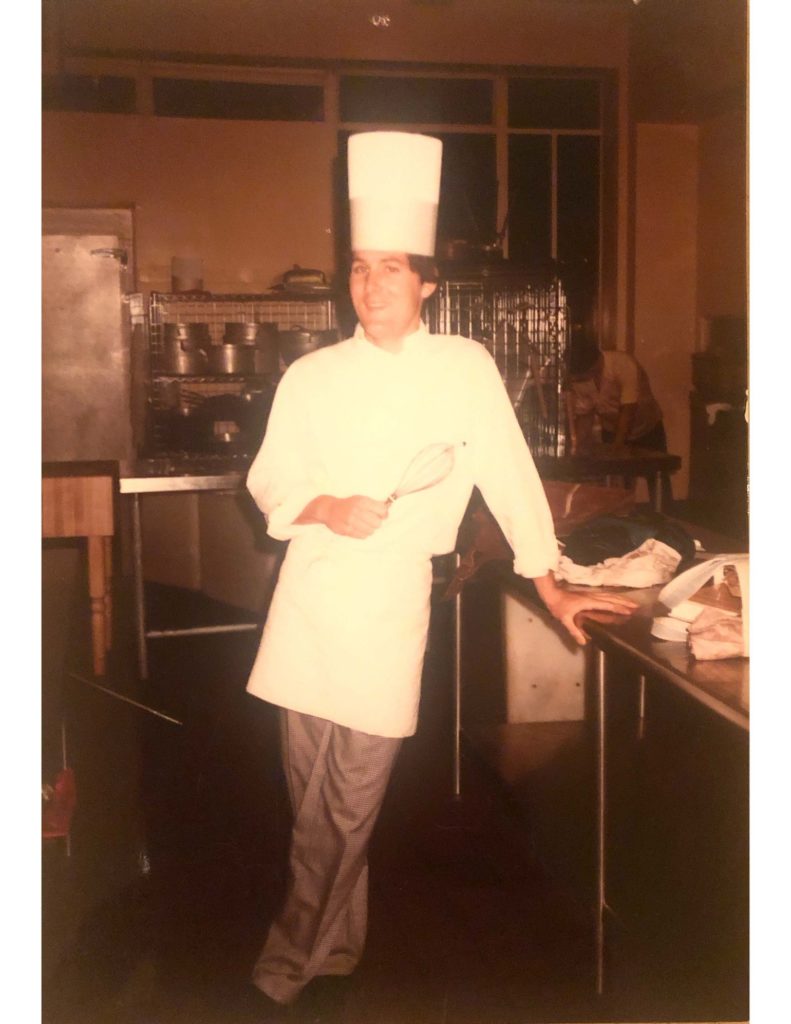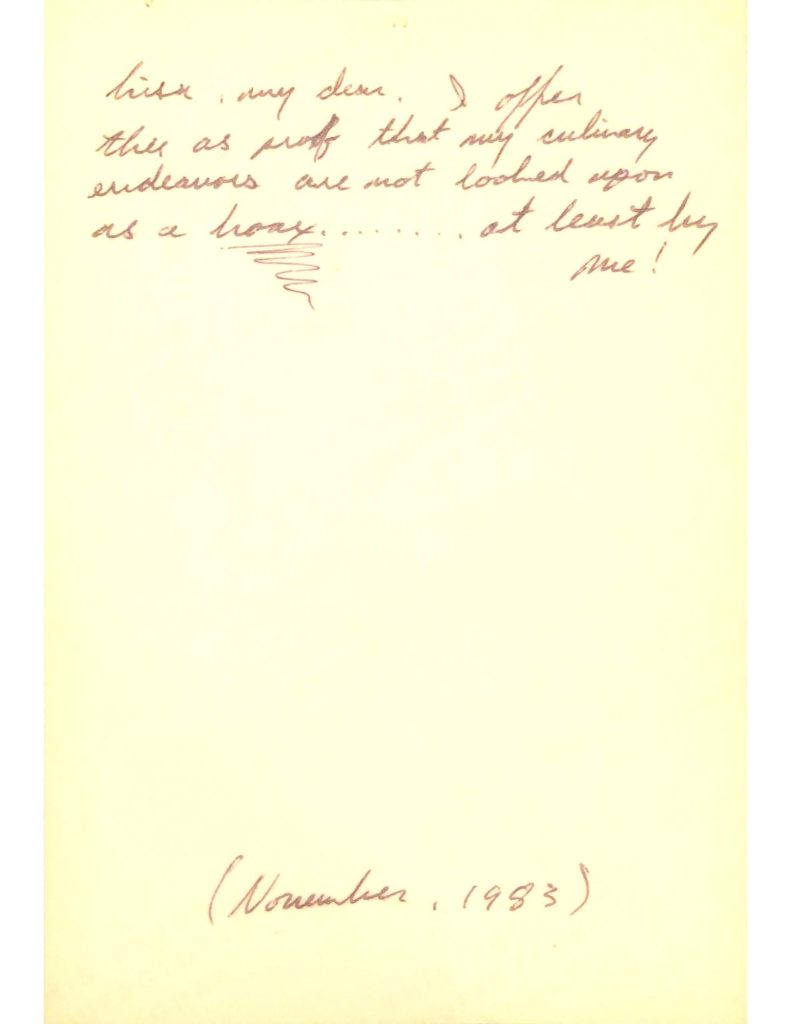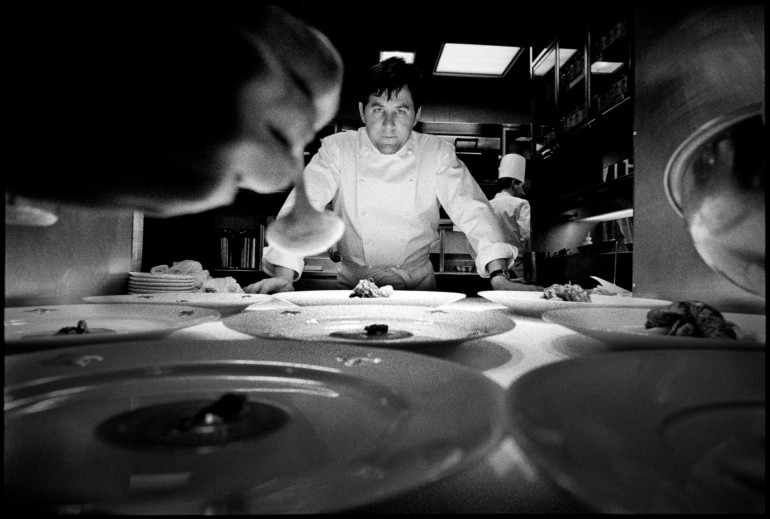“Hello, I’m Charlie Trotter if you give a %#@*&.” Those are the words spoken to chef Grant Achatz the first time he comes face to face with Charlie Trotter at the eponymous Lincoln Park restaurant he helmed between 1987 and 2012. In a riveting monologue made even more unsettling by a soundtrack of thrashing drums and cymbals, a young Achatz (the culinary mastermind behind legendary Chicago restaurants Alinea and Next) describes how Trotter used an employee’s benign mishandling of peaches as an excuse to publicly eviscerate him. The moment speaks volumes of Trotter’s tyrannical pursuit of excellence (and cinematically speaking, gives the infamous peach scene from Call Me by Your Name a run for its money).
In Love, Charlie: The Rise and Fall of Charlie Trotter, a new documentary that will have its world premiere at the 57th Chicago International Film Festival (Oct 13–24), filmmaker and Chicagoland native Rebecca Halpern makes her directorial debut with a heartbreaking portrait of a man split in two. To family and friends there is Chuck, the free spirit who follows his many muses, laces up for 2am runs, vociferously writes postcards to those he loves and leaves pages from Kerouac’s “On the Road” in diners all over America while crossing the country and dreaming of one day opening a restaurant. But to the rest of the world there is Charlie Trotter, the maverick chef who revolutionizes the food industry, tortures his staff and rivals, and dies embittered by the numerous up-and-comers nipping at his heels.

“My goal with this film was to humanize him in a way that had not really been done before,” says Halpern who grew up in the North Shore Chicago suburb Winnetka (Trotter is from nearby Wilmette) always hearing stories about the chef from her food writer mother who talked about Trotter like he was “some sort of magical unicorn that fell from outer space.” Not sold by the way local media often caricatured Trotter as a tyrant and fresh off developing a series about the 2019 Chicago mayoral race, Halpern decided to make a film that would set the record straight.
The original idea was to create a sort of version of Chef’s Table, and gather together his protégés to recreate his most famous dishes while simultaneously assembling a roundtable of friends and family to celebrate his life over a farm-to-table dinner. But Covid had other plans for the film. Since production on Love, Charlie began on day one of the quarantine, Halpern had to pivot to a more traditional documentary format, and it ends up suiting Trotter’s story well.
Thanks to hundreds of handwritten postcards along with the help of numerous talking heads including Achatz, Wolfgang Puck, Emeril Lagasse, Carrie Nahabedian and others like first hire Reginald Watkins, so-called best customer Ray Harris, his first wife Lisa Ehrlich (whose testimony provides some of the film’s most revealing moments) and Trotter himself, we root for Trotter’s success (the restaurant opens in 1987 and is an instant hit), dazzle at his numerous innovations and contributions (supporting area farmers, glossy cookbooks, an all vegetarian menu in a meat-loving city) loathe him for his brute managerial style (to describe Charlie Trotter’s as a toxic work environment would be an understatement), and ultimately feel shock when we learn of his sudden passing a year after closing his namesake eatery in 2012.
“He was the first American kid to open a great restaurant, to be fearless, invent new things,” says Puck in a statement that asks the audience to acknowledge Trotter for the pioneer that he was. Meanwhile, protégé and later rival Achatz paints a less rosy picture. “There was just a tornado of energy in that kitchen that was mixed with extreme fear, panic… it was very, very cutthroat, very intense,” he says in describing his first tour of Trotter’s Lincoln Park restaurant.
All of this is part of Halpern’s point. “I wanted to reveal him for who he was warts and all, but I didn’t feel like I wanted to make what you see today in a lot of documentaries which I call downfall porn,” she says. “I’m not interested in peeling apart the worst moments of his life for people’s entertainment and enjoyment. I’d much rather paint a more complex portrait of who he was and show him in his best days and his worst days and let the audience decide.”
Ironically, food plays a secondary role in the film. To thumb through one of Trotter’s numerous cookbooks is to be taken on a pioneering and salivating journey (Halpern refers to Trotter as the Godfather of food porn) where a piece of red snapper might be a centerfold and where even a turnip poached in olive oil gets the full bleed treatment. But the miniature masterpieces he created on the plate (two unique menus nightly over the course of 25 years) are largely missing in Love, Charlie. “We show relatively little food in the film and look how hungry you are,” Halpern says. “It just goes to show you what an intellectual exercise cooking was for Charlie. It was all about stimulating every sense and the mind was the sixth sense for him.”

Meanwhile, the city of Chicago plays a starring role and that’s no accident. Love, Charlie offers the bold claim that in the ‘90s, Chicago was the center of the universe and it’s difficult to dispute. While Trotter establishes his restaurant as the best in America if not the world, Michael Jordan is smashing records in basketball, Oprah Winfrey is collecting awards and accolades, and the Second City is cranking out yet another generation of future comedy legends including Tina Fey, Stephen Colbert, Amy Sedaris, Steve Carrell and Adam McKay among others. Halpern offers a version of Chicago that intentionally feels like a time capsule.
“The notion of legacy was very important to me,” says Halpern. “A lot of the chefs I spoke to in the film said that if they ask a lot of the younger people in their kitchens who Charlie Trotter was, many of them wouldn’t be able to answer that so I felt it incumbent upon me to remind people or educate people about what he did do,” Thus Halpern deliberately avoids shooting the city’s modern-day architectural masterpieces in favor of classic Chicago icons including Mies Van der Rohe buildings, Marina City, and sculptures by Miro, Calder and Picasso. “Unfortunately, we live in a time where, like Grant says, if you’re not on top you just don’t matter, and I wanted to make Charlie matter and I wanted to do it in a way that was relatable.”
By the early aughties, Trotter begins to suffer a string of disappointments. Michelin finally comes to Chicago but declines to award Charlie Trotter’s its coveted three-star rating, Achatz opens Alinea down the street effectively stealing the Trotter’s limelight for the first time, his health begins to decline, and he is the subject of a class action lawsuit related to compensation. In 2012, after 25 years in business, Trotter closes the restaurant and dies one year later. It’s a gut-punch end to a remarkable life, made even more lugubrious by descriptors from those nearest to him. “For some reason he thought life was shorter for himself and he often felt very isolated and very alone,” says Ehrlich.
But Love, Charlie makes clear our lasting impressions of the man should be genius, legacy, and excellence. “This film is very much his last postcard to all of us,” says Halpern. “To remind us of what it means to pursue excellence in everything we do and soak up life and live it and dive in.” Trotter may be gone, but he remains a key figure in the transformation of how we think about food—from the sourcing of local ingredients to the pedestaling of vegetables, to the artful presentations of dishes that appear on our Instagram feeds, “Chuck” had a hand in all of it.
Editor’s Note: You can watch Love, Charlie: The Rise and Fall of Chef Charlie Trotter from home, available to stream from Oct. 19 – 24. Purchased your tickets on the Chicago International Film Festival’s website.
More from Better:
- Head Back to the Office: Inside ‘The Office Experience’ Chicago
- Audrey Niffenegger’s Evanston Dream Project: Artists Book House
- The 57th Chicago International Film Festival Is Empowering Community Through Cinematic Storytelling: Donate Now and Your Contribution Will Be Matched

Jason Heidemann is a Los Angeles-based travel writer and cultural reporter who was previously an editor at Time Out Chicago, a columnist at the Chicago Tribune and has appeared on numerous TV shows on CBS, ABC and FOX among others.

